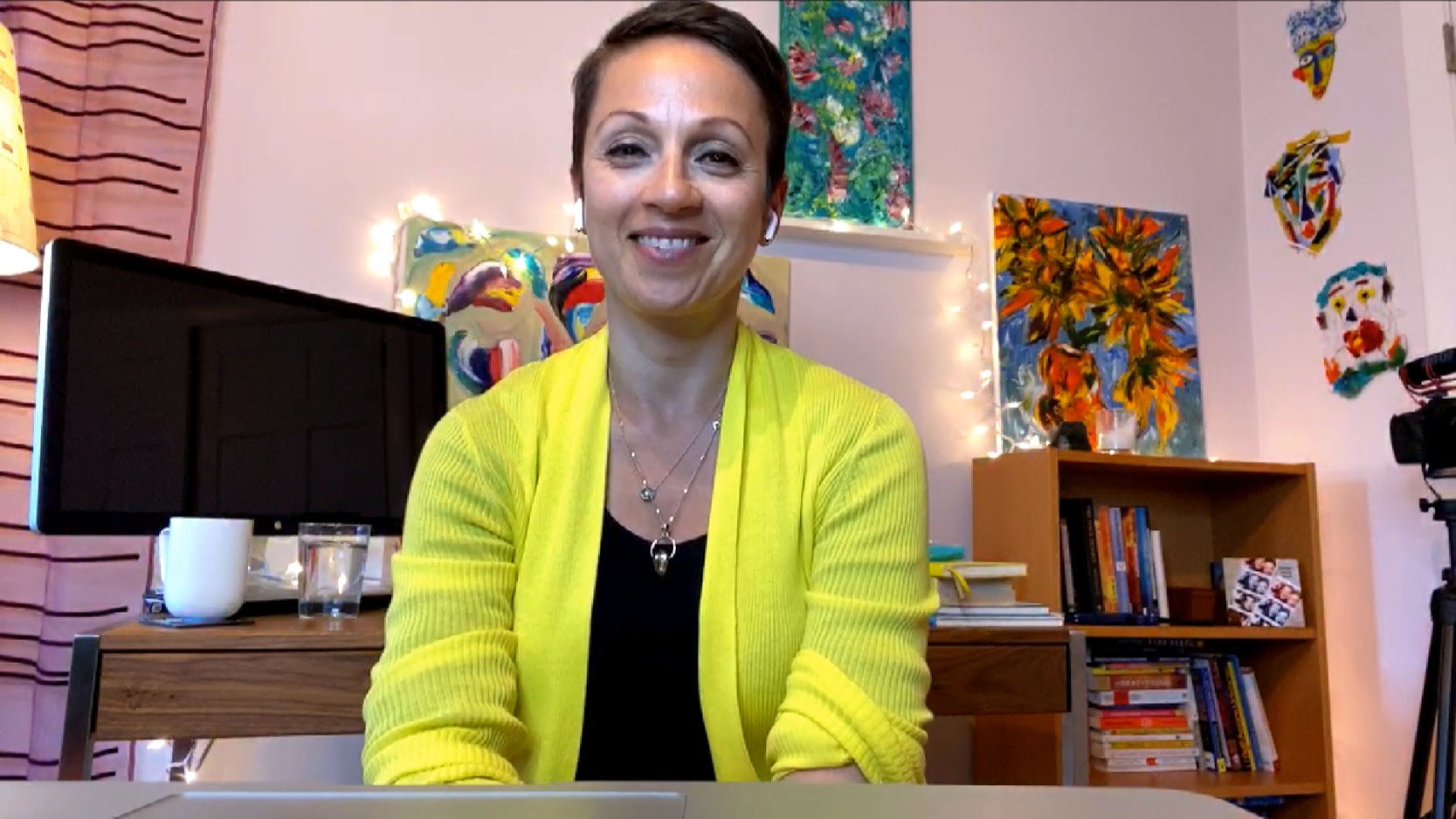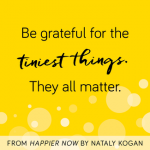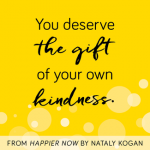 WOMEN IN TECH
WOMEN IN TECH
 WOMEN IN TECH
WOMEN IN TECH
 WOMEN IN TECH
WOMEN IN TECH
Success and happiness are inextricably intertwined, right? That one leads to the other is at the root of the rags-to-riches American Dream. Yet many who have won “the game of life” are deeply unsatisfied within. Chasing happiness through professional acclaim and financial success, they find that it is a seemingly unattainable goal.
“I’d feel happy. And then it would, like a bubble, just pop, and I didn’t feel happy anymore,” said Nataly Kogan (pictured), founder and chief executive officer of Happier Inc., creator of the Happier Method, and author of “Happier Now: How to Stop Chasing Perfection and Embrace Everyday Moments (Even the Difficult Ones).”
Kogan spoke remotely with Lisa Martin, host of SiliconANGLE Media’s livestreaming studio theCUBE, during the recent Women Transforming Technology Conference. They discussed how Kogan sought and found the secret to daily happiness in work and life, plus, how being authentic and open about emotions can strengthen and motivate teams during stressful situations. (* Disclosure below.)
This week theCUBE spotlights Nataly Kogan in its Women in Tech feature.
As a Russian émigré teen in Detroit, Kogan wanted to chase the American Dream. She thought that the path to a happy life came from, in her words, “doing a lot, achieving a lot, and making a lot of money.” So, she set out to do just that.
Before she hit 25, Kogan had taken a bite out of the Big Apple. She worked as a managing director at a New York venture capital firm and simultaneously founded an educational publishing company that she sold to Penguin Random House LLC.
It was an impressive start, but Kogan felt she could have more impact in technology. So she quit venture capital and founded Work It, Mom!. She built the company to be the largest online community supporting women in the workplace. Still, Kogan felt she could do more.
Moving back onto the corporate ladder, Kogan joined Microsoft as a senior program manager in the company’s Future Social Experiences, or FUSE, Labs. After only a year and a half, she was on the move again, accepting a boost to the executive level as vice president of consumer experience for Where Inc.
A little over two decades after arriving in the U.S. as a penniless refugee, Kogan was living the dream she had set out to claim. She was a successful executive with a picture-perfect family, big house, and expensive car. But, she still hadn’t achieved her dream of happiness.
“I just couldn’t do it anymore. I completely burned out,” Kogan said.
Searching for a career that gave her “joy in the present moment,” Kogan started to study the science behind happiness. This led her to “research in psychiatry and psychology and neuroscience, and learning all of these incredible skills and practices that changed my life,” she said.
The realization that she’d been seeking happiness when it was already around her everyday was a wake-up call for Kogan.
“One of the most powerful mindset shifts that I learnt on my journey is that happiness does not mean that you feel positive all the time,” she said. “Happiness and emotional well-being means that we embrace all of our different feelings, including the difficult ones, and we learn how to move through them with compassion.”
Realizing that happiness is a skill to learn, not a goal to achieve, was Kogan’s “ah-ha” moment. Wanting to share her breakthrough, she started her company, aptly named Happier, to teach others the simple, science-based techniques she herself was practicing.
If happiness is elusive under normal circumstances, it is doubly so as we live through the uncertainty of the current pandemic — and especially for those balancing working at home with the responsibilities of family life. Now an expert in the science of happiness, Kogan teaches workshops and speaks regularly about how to find fulfillment through practicing simple happiness skills.
“The first is the skill of gratitude,” she said, recommending the habit of noting one good event in every day and giving thanks for it. This doesn’t have to be anything big.
 “Research shows that it’s the frequency of small, positive experiences that contributes to our life’s satisfaction more than anything grand, so the smaller the better,” Kogan said. Examples are reconnecting with an old friend, a walk outside, or eating a treat.
“Research shows that it’s the frequency of small, positive experiences that contributes to our life’s satisfaction more than anything grand, so the smaller the better,” Kogan said. Examples are reconnecting with an old friend, a walk outside, or eating a treat.
Practicing gratitude is even more important during a crisis, according to Kogan. This is because humans have an evolutionary bias toward the negative that leads us to focus on bad news rather than good and emphasize the things that are wrong rather than what is right.
Pausing to give gratitude is a reminder that “the challenge is not everything,” Kogan explained. “That helps you to feel a little bit less stressed and anxious.”
The second skill that Kogan recommends is acceptance. This is simply viewing life situations and emotions with clarity, not judgement. Noticing the word “shouldn’t” in thought patterns is an easy way of checking if you are judging a situation rather than accepting it, according to Kogan. “Shorthand for judgment is shouldn’t: ‘It shouldn’t feel like this; this shouldn’t be this way,’ she said.
The challenge we all face right now is accepting the unknowns of living during a pandemic. Acknowledging and being compassionate to our employees, co-workers, friends, and family doesn’t mean relentless cheerfulness, according to Kogan.
“The bigger gift we can give them is to let them know that it’s okay to not be okay. And to honor their feelings with our acceptance,” Kogan said.
From a leadership standpoint, accepting that everyone is in a difficult and stressful place means leading with compassion. But also important is acknowledging your own stress levels and giving yourself permission to take a break.
Team dynamics are affected by the emotional well-being of the members, according to Kogan. She described it as if every team member holds a whiteboard displaying their emotional state. “Whether you want to admit [your emotions] or not, the team feels them, and it’s the same for everyone on the team,” she said.
Checking in with your personal “whiteboard” is a technique Kogan recommends to help stay calm and focused under stress. First, acknowledge your emotional state without passing judgement. Then, leaders should answer the question: “What is one thing I can shift to feel differently?” And then do it.
“Authenticity and acknowledging your humanity … is an incredibly helpful practice to help you be at your best,” Kogan said.
Here’s the complete video interview, part of SiliconANGLE’s and theCUBE’s coverage of the Women Transforming Technology Conference. (* Disclosure: TheCUBE is a paid media partner for the Women Transforming Technology Conference. Neither VMware Inc., the sponsor for theCUBE’s event coverage, nor other sponsors have editorial control over content on theCUBE or SiliconANGLE.)
Support our mission to keep content open and free by engaging with theCUBE community. Join theCUBE’s Alumni Trust Network, where technology leaders connect, share intelligence and create opportunities.
Founded by tech visionaries John Furrier and Dave Vellante, SiliconANGLE Media has built a dynamic ecosystem of industry-leading digital media brands that reach 15+ million elite tech professionals. Our new proprietary theCUBE AI Video Cloud is breaking ground in audience interaction, leveraging theCUBEai.com neural network to help technology companies make data-driven decisions and stay at the forefront of industry conversations.